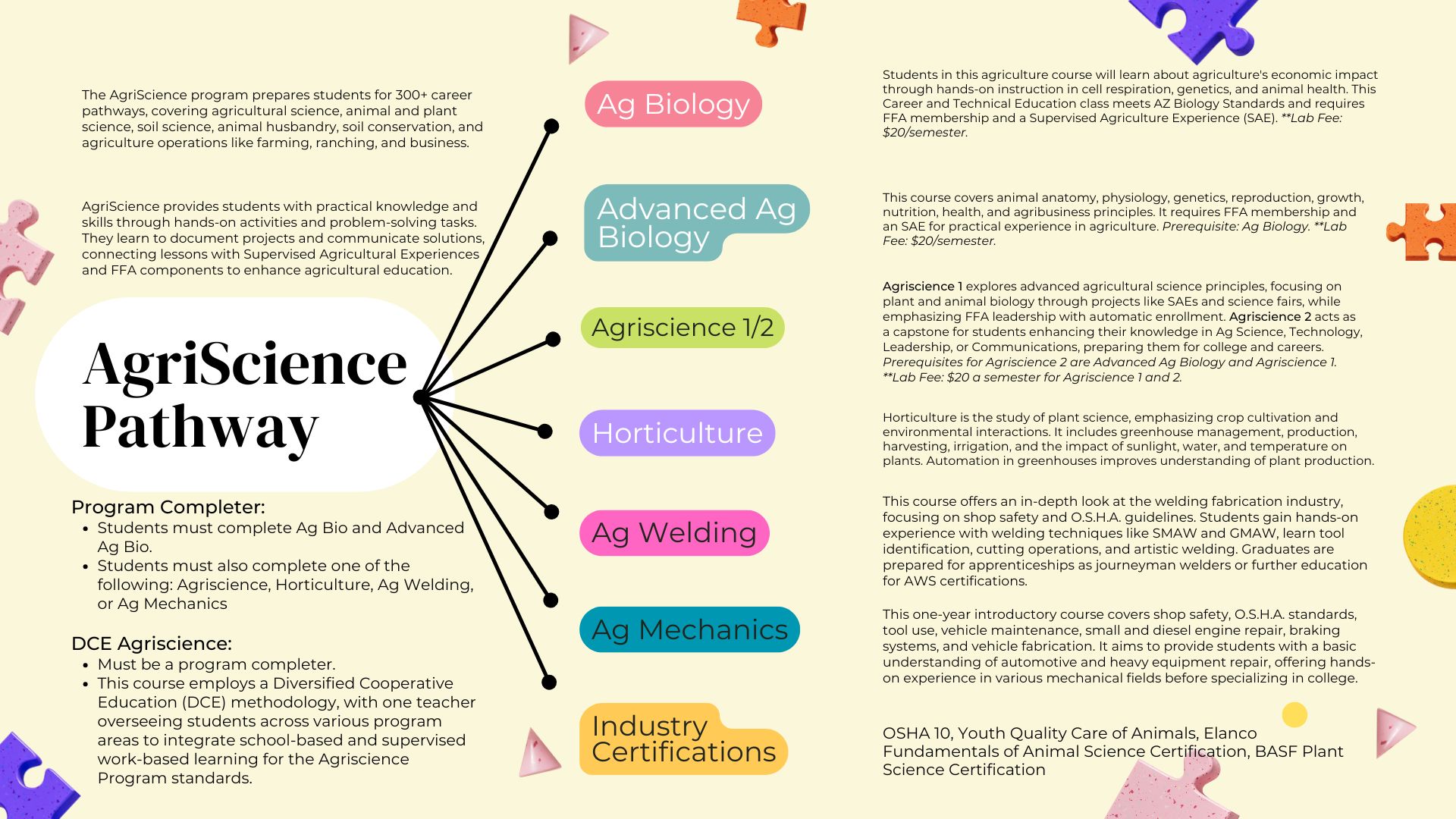
Check out Major Clarity to explore careers in the Agriscience Pathway.
Semester A + Semester B courses from the same subject area = 1.0 credit
One Semester courses (indicated below) = 0.5 credit
- AS/A level courses may be eligible for college credit by examination
- University bound students may not take Personal Finance A & B
AgriScience Pathway
The AgriScience program prepares students for 300+ career pathways, covering agricultural science, animal and plant science, soil science, animal husbandry, soil conservation, and agriculture operations like farming, ranching, and business.
AgriScience provides students with practical knowledge and skills through hands-on activities and problem-solving tasks. They learn to document projects and communicate solutions, connecting lessons with Supervised Agricultural Experiences and FFA components to enhance agricultural education.
Program Completer:
- Students must complete Ag Bio and Advanced Ag Bio.
- Students must also complete one of the following: Agriscience, Horticulture, Ag Welding, or Ag Mechanics
DCE Agriscience:
- Must be a program completer.
- This course employs a Diversified Cooperative Education (DCE) methodology, with one teacher overseeing students across various program areas to integrate school-based and supervised work-based learning for the Agriscience Program standards.
| Ag Biology | Students in this agriculture course will learn about agriculture's economic impact through hands-on instruction in cell respiration, genetics, and animal health. This Career and Technical Education class meets AZ Biology Standards and requires FFA membership and a Supervised Agriculture Experience (SAE). **Lab Fee: $20/semester. |
|---|---|
| Advanced Ag Biology | This course covers animal anatomy, physiology, genetics, reproduction, growth, nutrition, health, and agribusiness principles. It requires FFA membership and an SAE for practical experience in agriculture. Prerequisite: Ag Biology. **Lab Fee: $20/semester. |
| Agriscience 1/2 | Agriscience 1 explores advanced agricultural science principles, focusing on plant and animal biology through projects like SAEs and science fairs, while emphasizing FFA leadership with automatic enrollment. Agriscience 2 acts as a capstone for students enhancing their knowledge in Ag Science, Technology, Leadership, or Communications, preparing them for college and careers. Prerequisites for Agriscience 2 are Advanced Ag Biology and Agriscience 1. **Lab Fee: $20 a semester for Agriscience 1 and 2. |
| Horticulture | Horticulture is the study of plant science, emphasizing crop cultivation and environmental interactions. It includes greenhouse management, production, harvesting, irrigation, and the impact of sunlight, water, and temperature on plants. Automation in greenhouses improves understanding of plant production. |
| Ag Welding | This course offers an in-depth look at the welding fabrication industry, focusing on shop safety and O.S.H.A. guidelines. Students gain hands-on experience with welding techniques like SMAW and GMAW, learn tool identification, cutting operations, and artistic welding. Graduates are prepared for apprenticeships as journeyman welders or further education for AWS certifications. |
| Ag Mechanics | This one-year introductory course covers shop safety, O.S.H.A. standards, tool use, vehicle maintenance, small and diesel engine repair, braking systems, and vehicle fabrication. It aims to provide students with a basic understanding of automotive and heavy equipment repair, offering hands-on experience in various mechanical fields before specializing in college. |
| Industry Certifications | OSHA 10, Youth Quality Care of Animals, Elanco Fundamentals of Animal Science Certification, BASF Plant Science Certification |
